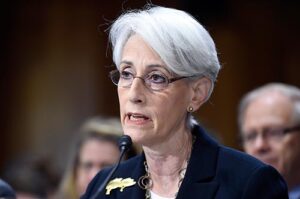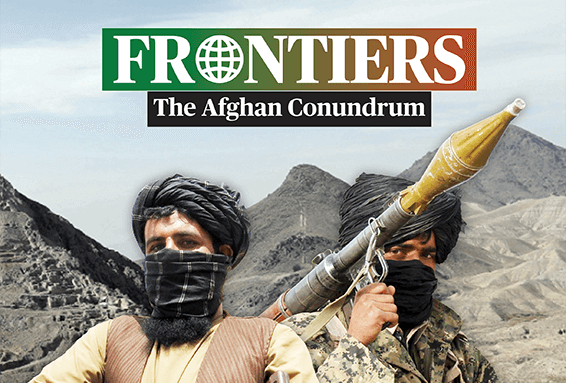Ever since the withdrawal of American troops from Afghanistan there has been visible unease in Islamabad regarding how the situation pans out in Afghanistan and its impact on Pakistan-US relations. Islamabad appears to be gearing up for the worst, as the signals from Washington are ominous. It is not Afghanistan alone, but the US attitude towards the entire region and its emerging tensions with China and Russia and the pressure on Iran that is shaping the future turn of events for the region. Despite the transactional nature of the relationship, Pakistan’s geographical location can still prove to be a bargaining chip that could save the Americans from becoming isolated in the entire region.
Almost eight months after the Biden administration’s coming to power, the first-ever official visit between the two countries took place at the Foreign Office level. The visit of the Deputy Secretary of State, Wendy Sherman, was not supposed to break the freeze. It was meant to measure up each other’s intentions. The coldness in the reception was visible during Ms Sherman’s stay in Islamabad.

After its withdrawal, the US is in a reappraisal mode — to find out what went wrong in Afghanistan. The US Secretary of State, Antony Blinken, had to face the grilling of the Congress on September 14 on the Taliban’s capture of Kabul as the US-installed Ashraf Ghani fled the country and his government melted away. While he had many explanations regarding the failure of the Ghani government, his remarks about Pakistan should be a matter of concern in Islamabad.
The most critical aspect of Blinken’s deposition at the Congress hearing was that “Pakistan has a multiplicity of interests, some that are in conflict with ours.” He further added: “It is one that is involved hedging its bets constantly about the future of Afghanistan, it’s one that’s involved harbouring members of the Taliban … It is one that’s also involved in different points [of] cooperation with us on counterterrorism.”
While Mr Blinken may have been looking for easy options by scapegoating Pakistan, it was hard for him to deny that the US negotiated the withdrawal of American troops from Afghanistan with the Taliban. If the Taliban were terrorists, then why did the Americans deal with them? Not only that, the US sidelined the Ashraf Ghani government in the withdrawal agreement. Intriguingly, the American Congress is now questioning the merits of the withdrawal, conveniently ignoring the fact that the withdrawal decision enjoyed bipartisan support.

President Trump’s administration decided to sign the agreement with the Taliban and President Joe Biden went by Trump’s decision. Even if Trump had ignored the Ashraf Ghani government while signing the agreement, Mr Blinken’s scathing letter to President Ghani warned the latter to put his act together to reach an understanding with the Taliban. So, where lies the problem?
Domestic politics in the US has a different axe to grind. The Democrats and the Republicans want to demonise each other to prepare the ground for the next congressional elections in 2022 and the presidential elections in 2024. Given the growing acrimony in American politics, the Biden administration or the Republicans would have no qualms in throwing Pakistan under the bus.
Regarding the American allegation of Pakistan hobnobbing with the Taliban, it is no more a secret that since 2010, the US had started discussing withdrawal options with the Taliban. Major European countries were also in touch with the Taliban at Doha.
Another fact not to be forgotten is that the US opened the Taliban’s political office in Doha in June 2013, after two years of negotiations. They released the Taliban prisoners from Guantanamo Bay and brought them to Doha. Mullah Abdul Ghani Baradar, who was in a Pakistani prison for the past eight years, was released in October 2018 and taken to Doha at the behest of the US. Therefore, blaming “Pakistan’s multiplicity of interests” holds no water when the Americans themselves were negotiating a pullout deal with the Taliban. Moreover, Pakistan was not part of the negotiations between the Taliban and the Americans.
On 28th September, 22 Republican Senators presented a Bill entitled “Afghanistan Counterterrorism, Oversight, and Accountability Act of 2021,” which aims to comprehensively legislate the lessons learnt and make the persons and entities accountable. Under Section 202 (b), the Bill seeks “assessment of support by state and non-state actors, including the Government of Pakistan, for the Taliban between 2001-2020, including the provision of sanctuary space, financial support, intelligence support, logistics and medical support, training, equipping, and tactical, operational, or strategic direction.”
Speculations are rife that the US may be contemplating imposing sanctions against Pakistan. It is quite plausible; sanctions are not new for Pakistan. Since the mid-sixties, Pakistan has been the “most sanctioned” ally of the United States. It faced arms embargoes during the 1965 and 1971 wars with India. In 1974, India conducted nuclear explosions, but Pakistan had to bear the brunt of nuclear-related sanctions. After the withdrawal of the Soviets from Afghanistan in 1989, the US imposed sanctions in the subsequent year accusing Pakistan of following the nuclear weapons programme. Again, when Pakistan reciprocated the Indian nuclear explosions, it had to face American sanctions in 1998.
Even after being declared a Non-NATO Ally post- 9/11, Pakistan had to suffer for joining the War on Terror. Soon after being declared a non-NATO ally, the US and its NATO partners issued travel advisories to their citizens about Pakistan. It was an “unannounced sanction” against Pakistan, as investors and ordinary tourists were reluctant to travel to Pakistan; consequently, Pakistan’s exports became expensive due to high insurance costs. And more recently, New Zealand and the English cricket teams’ refusal to play in Pakistan on grounds of security should serve as a precursor to the pressures Pakistan is likely to face in the future.
It appears that the Biden administration would try its utmost to save face on the withdrawal episode, which has become an iconic embarrassment for it, apart from denting American credibility the world over. For Pakistan, the US’ obliviousness towards frequent protestations about India’s subversive role in using Afghan soil against Pakistan during the past 20 years, pushed the latter to adopt a counter-strategy to avert a two-front situation. India’s support to the Baloch dissidents, running their training camps in Afghanistan, was presented in a dossier to the Americans. Similarly, the Tehreek e Taliban Pakistan (TTP) received financial assistance from India, but the US officials maintained a meaningful silence.
It is not surprising that since Pakistan and China signed the China-Pakistan Economic Corridor (CPEC) agreement in 2013, US-Pakistan relations have started deteriorating. One remembers how the Americans would express their scepticism about the agreement. When work on the various CPEC projects commenced, it began throwing feelers about the efficacy of those projects and even raised the “debt trap” bogey to create hurdles when Pakistan sought IMF’s assistance. Now that the US is convinced that it cannot break the strategic partnership between Pakistan and China, it will be looking at some pretext or other to target Pakistan.
However, one thing is clear: Pakistan’s geographical location is its most significant asset, and the US is fully aware of this. It may subject Pakistan to sanctions, but in the process, it could end up being isolated in the region and deprive itself of a formidable ally that may, for the sake of peace and stability, still act as a bridge with its adversaries, whether China or Iran. Mr Biden will soon realise that winds of change are already blowing in the region.

The author is a former Ambassador of Pakistan in Iran and the UAE. Currently, he is working as a Senior Research Fellow in the Islamabad Policy Research Institute (IPRI).



